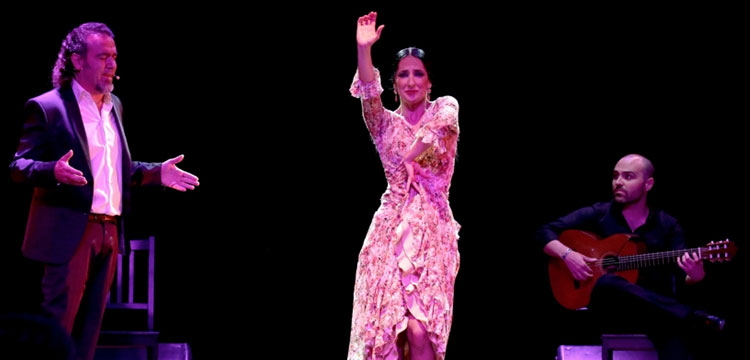The Jerez dancer, acompanied by David Lagos and Santiago Lara, receives an ovation at the Festival Flamenco Kulturpark Traun with “Baile de Palabra”, a show she’s been performing since 2012.
Silvia Cruz Lapeña
There were two unknowns the night Mercedes Ruiz’ “Baile de Palabra” was presented at the Festival Flamenco Kulturpark Traun. The first, seeing how the audience would react in an Austrian town of 24,000 people where this sort of event is being presented for the first time in their history. The second, finding out at what point a show that debuted six years ago would be.
That the Jerez dancer’s work is impeccable, is something she demonstrated no sooner than appearing on stage, but dance is a discipline understood in any language, which is why the most surprising thing was that David Lagos’ singing would be received as if the people of Traun had been hearing it all their lives. There were more “bravos” than “oles”, but it was clear from the opening bulerías that the audience understood the show.
Dancing with no hurry
Ruiz danced impeccably. The most beautiful thing of her dancing is watching how the upper part of her body dialogues with the lower one: without pushing it, without shouting or competing. Elegance is the operative term, but also good humor, something often missing in the flamenco dancing of some of her peers. Her way of articulating the fingers with delayed reaction, as if it gave her pleasure and she did it consciously, is a good example of the way in which this flamenco lady takes on dance. And without giving up putting her Jerez sparks.
The interesting thing about “Baile de Palabra” is seeing what good results are achieved by three interpreters without a rhythm backup, nor any instrument other that a guitar; Ruiz, Lagos and Santiago Lara hold the show together for an hour and a half during which she dances, with costume changes included, with no rest, and the singer accompanying with silence now and again. Lara directs the music and composed a well-paced work, without being flashy, but with lovely moments such as when Ruiz dances peteneras, or Lagos sings some high and long tonás, perfectly tuned and thoroughly bone-chilling, nearly managing to change the “bravos” of the people of Traun into “oles”.
Lagos en plena forma
Caracoles danced by Ruiz in trousers, light-hearted and upbeat, was much-applauded. As were the pregones of Lagos whom we must stop scolding for being such a perfectionist. Let him be that way, please, the result of that obsession is a delight for flamenco fans. The audience understood the difficulty of an apparently simple show, and also the dedication, which is why they applauded energetically and made the artists come out for two curtain calls.
And as far as the state of this work which these people from Jerez have performed many times in these six years, well, there are newly-minted shows that already have the whiff of camphor, and this isn’t one of them. The key, without a doubt, is that “Baile de Palabra” is a classic project, not rancid, and has the feel of something made to last, not to be short-lived.
